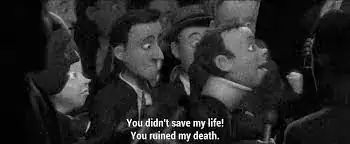No
In the United States all 50 states have a version of the Good Samaritan Law that provides legal protection to people who give reasonable assistance to those who are, or whom they believe to be injured, ill, in peril, or otherwise incapacitated.
New York specifically has several statutes covering Good Samaritan laws.
"NY CLS Pub Health § 3000-a (2009) § 3000-a. Emergency medical treatment" covers people in general.
- Except as provided in subdivision six of section six thousand six hundred eleven, subdivision two of section six thousand five hundred twenty-seven, subdivision one of section six thousand nine hundred nine and sections six thousand five hundred forty-seven and six thousand seven hundred thirty-seven of the education law, any person who voluntarily and without expectation of monetary compensation renders first aid or emergency treatment at the scene of an accident or other emergency outside a hospital, doctor’s office or any other place having proper and necessary medical equipment, to a person who is unconscious, ill, or injured, shall not be liable for damages for injuries alleged to have been sustained by such person or for damages for the death of such person alleged to have occurred by reason of an act or omission in the rendering of such emergency treatment unless it is established that such injuries were or such death was caused by gross negligence on the part of such person. Nothing in this section shall be deemed or construed to relieve a licensed physician, dentist, nurse, physical therapist or registered physician’s assistant from liability for damages for injuries or death caused by an act or omission on the part of such person while rendering professional services in the normal and ordinary course of his or her practice.
- (i) A person who, or entity, partnership, corporation, firm or society that, purchases or makes available resuscitation equipment that facilitates first aid, [fig 1] an automated external defibrillator or an epinephrine auto-injector device [fig 2] as required by or pursuant to law or local law, or (ii) [fig 3] an emergency health care provider [fig 4] under a collaborative agreement [fig 5] pursuant to section three thousand-b of this article with respect to an automated external defibrillator, [fig 6] or (iii) the emergency health care provider with a collaborative agreement under section three thousand-c of this article with respect to use of an epinephrine auto-injector device, [fig 7] shall not be liable for damages arising either from the use of that equipment by a person who voluntarily and without expectation of monetary compensation renders first aid or emergency treatment at the scene of an accident or medical emergency, or from the use of defectively manufactured equipment; provided that this subdivision shall not limit the person’s or entity’s, partnership’s, corporation’s, firm’s society’s or the emergency health care provider’s liability for his, her or its own negligence, gross negligence or intentional misconduct.
Some countries even have a duty to rescue which takes this further to the point where a person can be held liable for failing to come to the rescue of another party who could face potential injury or death without being rescued.
Historically
MJD has pointed out that the scene in question happened in 1947.
The first Good Samaritan statute was passed in 1959 in California.
New York has had one since at least September 2014, but that's as far back as the NYS website goes.
Trained professionals
BOCCASILE v. CAJUN MUSIC LIMITED (1997) shows that volunteers are covered by Good Samaritan Laws at least in Rhode Island.
New York has several statutes covering professionals including "§ 6547. Emergency services rendered by physician assistant"
Notwithstanding any inconsistent provision of any general, special or local law, any physician assistant properly registered in this state who voluntarily and without the expectation of monetary compensation renders first aid or emergency treatment at the scene of an accident or other emergency, outside a hospital, doctor’s office or any other place having proper and necessary medical equipment, to a person who is unconscious, ill or injured, shall not be liable for damages for injuries alleged to have been sustained by such person or for damages for the death of such person alleged to have occurred by reason of an act or omission in the rendering of such first aid or emergency treatment unless it is established that such injuries were or such death was caused by gross negligence on the part of such physician assistant. Nothing in this section shall be deemed or construed to relieve a licensed physician assistant from liability for damages for injuries or death caused by an act or omission on the part of a physician assistant while rendering professional services in the normal and ordinary course of his practice.
Again this doesn't specifically cover preventative action.
